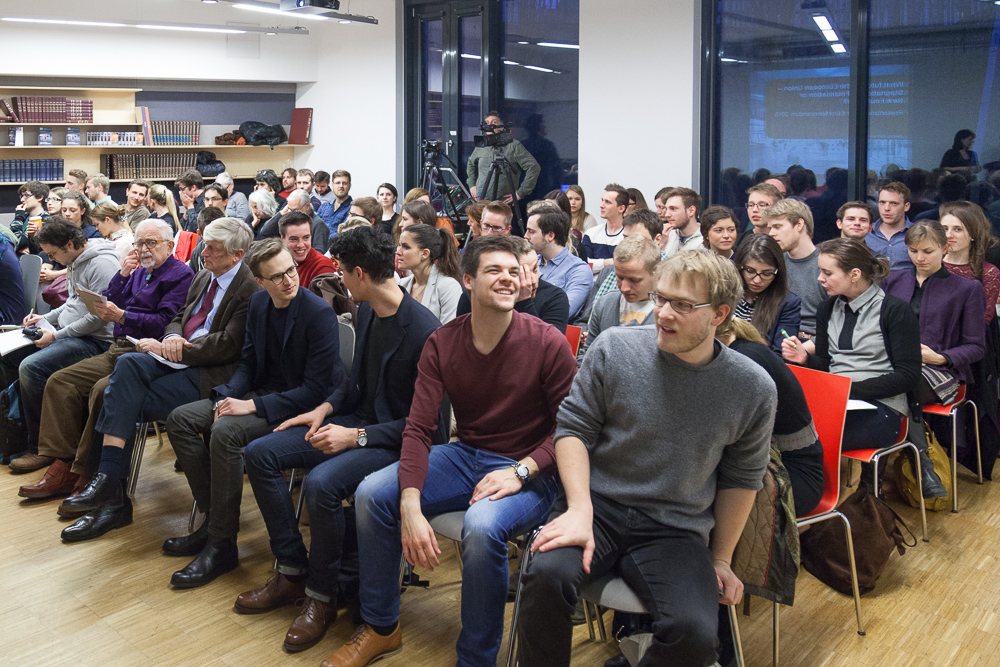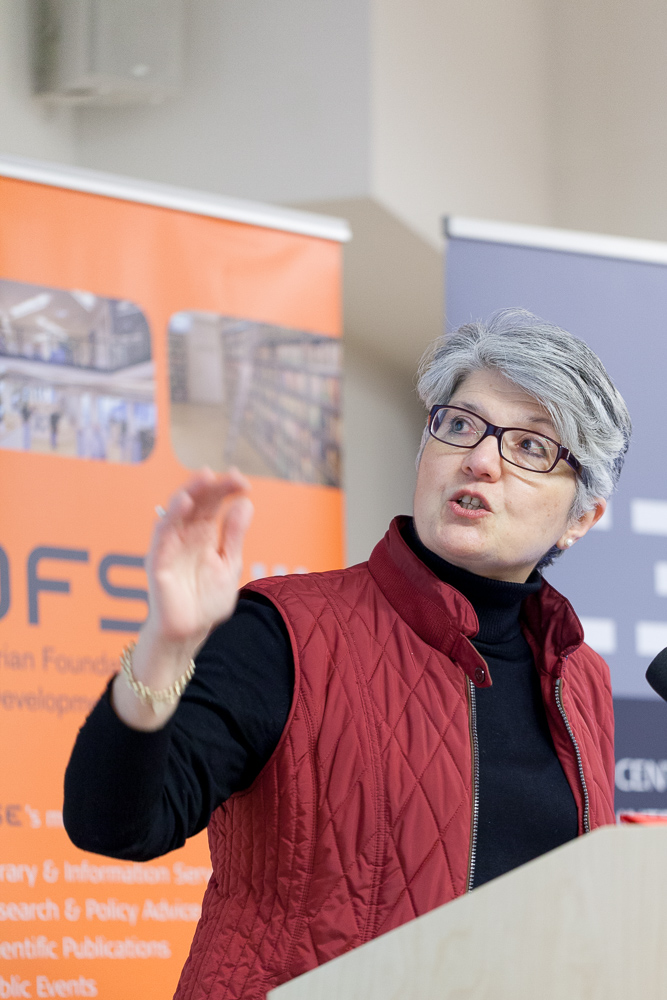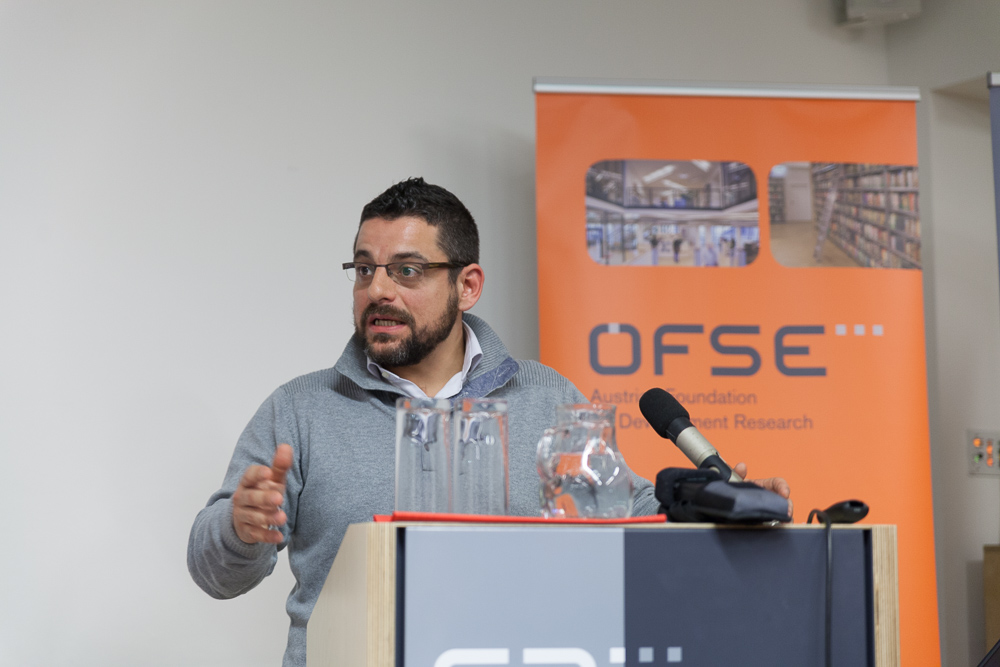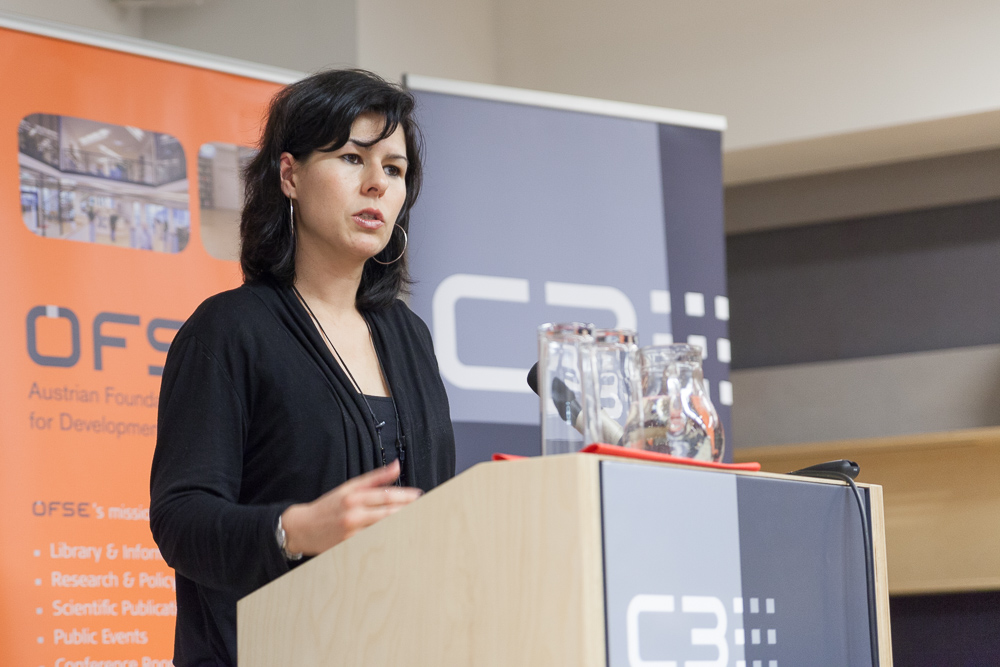VA Dokumentation: Perspektiven fortschrittlicher Wirtschaftstheorie und -praxis
Nach der Krise war die Ökonomik recht stark in der Kritik: Davon ausgehend fand bereits im Frühjahr eine Diskussionsveranstaltung auf der Wirtschaftsuniversität Wien zur Bestandsaufnahme statt, diese Veranstaltung sollte nun den Diskurs weiterlenken in Richtung Strategien für eine heterodoxe Ökonomik.
Denn oft genug wird so getan, als sei die herrschende ökonomische Schule der Neoklassik der einzig mögliche Ansatz. Dem stellt sich die Plurale Ökonomik mit ihrer theoretischen und methodischen Vielfalt entgegen und zeigt andere Optionen auf. Der Impuls für die Erneuerung kommt klar von den Studierenden, die eine scheinbare Alternativlosigkeit zum bestehenden Wirtschaftssystem nicht länger akzeptieren wollen.
 Wie in der Diskussion festgestellt wurde: Das derzeitige wirtschaftliche Paradigma ist angekratzt, aber hält trotz der Krise. Eine inhaltliche Beeinflussung ergibt sich zwar beständig durch kleine Initiativen und verschiedene Diskursräume, doch auch politische Lösungen sind letztlich gefragt. Die meisten wissenschaftlichen Diskussionsräume sind sehr dogmatisch und verkrustet. Die Institutionen müssen geöffnet werden und Pluralismus sollte endlich Einzug halten, lautet eine der Hauptforderungen. Es gibt zwar verschiedene Spielwiesen, aber strukturell ändert sich kaum etwas, so der Tenor am Podium. Es gibt etwas mehr Pluralität, aber nur soweit, als es das Ergebnis nicht verändert.
Wie in der Diskussion festgestellt wurde: Das derzeitige wirtschaftliche Paradigma ist angekratzt, aber hält trotz der Krise. Eine inhaltliche Beeinflussung ergibt sich zwar beständig durch kleine Initiativen und verschiedene Diskursräume, doch auch politische Lösungen sind letztlich gefragt. Die meisten wissenschaftlichen Diskussionsräume sind sehr dogmatisch und verkrustet. Die Institutionen müssen geöffnet werden und Pluralismus sollte endlich Einzug halten, lautet eine der Hauptforderungen. Es gibt zwar verschiedene Spielwiesen, aber strukturell ändert sich kaum etwas, so der Tenor am Podium. Es gibt etwas mehr Pluralität, aber nur soweit, als es das Ergebnis nicht verändert.
Die Rolle der Politik abseits von öffentlicher Auftragsvergabe ist eine der großen Fragestellungen. Sie kann Position beziehen und Probleme adressieren. Die Stadt Wien bekennt sich beispielsweise zu einer antizyklischen Fiskalpolitik. Klar wird auch über die Dominanz der Ökonomie über die Politik gesprochen, die eine gewisse Pseudo-Rationalität erzeugt. Diskursräume in der staatlichen Praxis müssen definitiv erkämpft werden, um in weiterer Folge eine Umsetzung pluraler Lösungsvorschläge zu bewirken. Durch einen policy mix sind Alternativen jedenfalls auch im Kleinen möglich.
An den Universitäten gibt es auch genügend Entwicklungspotenzial, was heterodoxe Strömungen in der Forschung und Lehre angeht. Im Zusammenhang mit den wissenschaftlichen Journalen werden die bestehenden Abläufe, Kriterien und Ratings stark kritisiert, hier bedarf es immer noch einiger Änderungen. Die Frage der Finanzierung über Drittmittel sowie öffentliche Gelder und die jeweils dementsprechend mögliche Beeinflussung der Ergebnisse von wissenschaftlicher Arbeit ist ebenfalls zentral. Die zentralen Themenkomplexe von (Un-) Gleichheit, Arbeit (-slosigkeit) und Ökologie müssen jedenfalls bearbeitet werden.
Für die Plurale Ökonomik als Bewegung ist es generell notwendig, nicht in der Kritik stecken zu bleiben sondern Neues zu entwickeln. Sei es innerhalb der bestehenden Kernbastionen oder in selbst aufgebauten Strukturen, diese Strategie der Interdisziplinarität ist anspruchsvoll und entwickelt sich ständig weiter.
Es diskutierten:
Franziska Disslbacher, Studentin, Gesellschaft für Plurale Ökonomik Wien
Klemens Himpele, Volkswirt, Stadt Wien, MA 23 – Wirtschaft, Arbeit und Statistik
Ralf Ptak, Wirtschaftswissenschaftler Universität Köln, Wissenschaftlichen Beirat Attac (Lindauer Manifest), Netzwerk Plurale Ökonomik
Moderation: Romana Brait, BEIGEWUM
Eine gemeinsame Veranstaltung des BEIGEWUM, der Gesellschaft für Plurale Ökonomik Wien, Roter Börsen Krach und der Mastervertretung VW.Sozök.SEPP.
Videoaufzeichnung der Diskussion im Republikanischen Club
Gesellschaft Plurale Ökonomik Wien
Internationaler studentischer Aufruf für eine Plurale Ökonomik – Manifest
Leitlinien der Wiener Wirtschaftspolitik
(Photo credit: Peter Reitmayr)
VA Dokumentation: Zugangsbeschränkungen und Chancen(un)gleichheit im österreichischen Hochschulsystem
Eine Wirkung von Aufnahmeverfahren und Zugangsbeschränkungen lässt sich spätestens nach der Lektüre dieser Studie nicht mehr leugnen: Sie bewirken soziale Selektion, und das ziemlich massiv. Von der viel beschworenen Chancengleichheit im österreichischen Bildungssystem bleibt anhand des umfangreichen Datenmaterials dieser Studie nicht viel übrig. Die StudienautorInnen Friesinger/Palienko/Straner zeigen klar auf, dass Bildung immer noch über den soziokulturellen Status vererbt wird.
 Darüber hinaus wurden im Rahmen dieser Veranstaltung die Parallelen und Unterschiede zum deutschen Bildungssystem erläutert und diskutiert, dafür konnte Sonja Staack als Expertin gewonnen werden. Insgesamt ein anregender Abend im Republikanischen Club, der auch verschiedene Ansätze und Ideen liefert, wie es anders gehen könnte.
Darüber hinaus wurden im Rahmen dieser Veranstaltung die Parallelen und Unterschiede zum deutschen Bildungssystem erläutert und diskutiert, dafür konnte Sonja Staack als Expertin gewonnen werden. Insgesamt ein anregender Abend im Republikanischen Club, der auch verschiedene Ansätze und Ideen liefert, wie es anders gehen könnte.
Es diskutierten die Studienautorin Anna PALIENKO sowie Sonja STAACK – Referentin im Vorstandsbereich Hochschule und Forschung der Gewerkschaft Erziehung und Wissenschaft (GEW). Moderation: Jana SCHULTHEISS (BEIGEWUM)
Videoaufzeichnung der Diskussion im Republikanischen Club
Studienpräsentation Handout – Ausgewählte Grafiken
(Photo credit: Peter Reitmayr)
Documentation: What future for the European Union – Stagnation and Polarisation or New Foundations?
Presentation of the Euromemorandum 2015
with:
Marica Frangakis (Nicos Poulantzas Institute, Athens)
Iván H. Ayala (ICEI, econoNuestra and Podemos, Madrid)
Elisabeth Springler (University of Applied Sciences bfi Vienna)
Werner Raza (ÖFSE)
Organizers: ÖFSE, BEIGEWUM in cooperation with Wirtschaftspolitische Akademie
Photo credit: Peter Reitmayr

Werner Raza gave the general introduction on the contents of the Euromemorandum 2015.
The EuroMemo is the annual report on the state of the European economy, issued and written by a network of heterodox and progressive economists and social scientists. The aim of the EuroMemo Group is to contribute to a model of European integration that is promoting full employment with good work, social justice with an eradication of poverty and social exclusion, ecological sustainability, and international solidarity.
The main Areas of this year’s report are: Macroeconomic policies and the alternatives to stagnation, finance and the euro crisis, industrial policy and the reshaping of economy, social policy and combating inequality, international trade and investment policy – TTIP and the EU neighbourhood policies.

Werner Raza went in his presentation more into detail on the major conclusions and recommendations related with the area of macroeconomic policies and the alternatives on stagnation. The analysis is that austerity policies are still persisting at European Union level and have certainly reinforced economic stagnation and particular in the crisis countries of the European periphery also decline. Most importantly they also have exacted a heavy social toll from the EU citizens. The recovery amongst the European countries is described as weak, fragile and uneven. EU policies are trapped in the wrong theories (supply-side economics, structural reforms, and competitiveness) and bad institutions that make it very difficult to escape this policy strategy (SDG, Fiscal compact). Alternative policies proposed by the EuroMemo Group are:
- Substitution of fiscal compact for a fiscal policy agreement focused upon the agreement focused upon the pursuit of high and sustainable levels of employment
- Effective federal level fiscal policy with redistribution between rich and poor regions, increase size of EU budget from 1% currently to 10% long-term
- European wide system of unemployment insurance
- Creation of new EU Public Investment Bank, annual investment programme of 2% of EU GDP over 10 year period for funding social-ecological transformation
- Tax on all financial transactions, uniform EU corporate tax rate, closing of offshore financial centres and ECB funding for public investment
Marica Frangakis addressed the current economic situation in Greece and the political agenda of the new government, called in her presentation “A crack in the politics of austerity”. This is seen as a historically important moment in the development of the crisis.
First Frangakis gave an overview on the hegemonic narrative of the austerity politics. It’s basically the idea that a state has to be run a family household, which is against economic logic and therefore wrong. This narrative served the purpose of justifying the flow of funds to the financial market, the support provided to the banks, via governments of indebted countries and at the same time to deflect pressure for financial policy reform. In implementing this narrative into economic policies, it was a “useful” crisis in Greece. Before the crisis there was a fast rate of expansion, a combination of domestic, European and global factors then led to the unsustainability of Greece’s public finances. The narrative of “Profligate government – Lazy workers” came in and austerity politics were deployed. The loans of 2010 and 2012 were conditional on implementation of severe fiscal austerity, deregulation and privatization. Additionally more than 80% of this 237 billion Euros were channelled to European and Greek banks. The data on the GDP and its components shows clearly that the Greek economy is shrinking. The Austerity policy failed even in its main aim, to put the public finances back to order. The public deficit as well as the debt of Greece is rising the last years. The debt as percentage of the GDP has risen from 103,4 in 2006 to 174,9 in 2013, the deficit from 6,1 to 12,2 in the same period.
 This goes together with unprecedented social hardship: Unemployment, poverty and inequality has risen. Unemployment went up from 8% of the labour force in 2007 to 18% in 2011 and 28% in 2013; two-thirds of the unemployed have been without a job for over one year. Certain groups are hit the hardest: In 2013, the unemployment rate for Women was equal to 31% and to 58% for the under 25s, from 16% and 23% respectively in 2007. The increased flexibility of the labour market has resulted in a steep increase in individual and firm-level work contracts and in a decline in private sector wages by more than 30%. Also Pensions are reduced by more than 30%. There were huge cuts in public health and education expenditure. More than one-third (36%, 2013) of the population is below the poverty line and/or severely materially deprived.
This goes together with unprecedented social hardship: Unemployment, poverty and inequality has risen. Unemployment went up from 8% of the labour force in 2007 to 18% in 2011 and 28% in 2013; two-thirds of the unemployed have been without a job for over one year. Certain groups are hit the hardest: In 2013, the unemployment rate for Women was equal to 31% and to 58% for the under 25s, from 16% and 23% respectively in 2007. The increased flexibility of the labour market has resulted in a steep increase in individual and firm-level work contracts and in a decline in private sector wages by more than 30%. Also Pensions are reduced by more than 30%. There were huge cuts in public health and education expenditure. More than one-third (36%, 2013) of the population is below the poverty line and/or severely materially deprived.
According to these huge economic and social challenges the Political system has changed too, in a way that is unique to Greece. The two establishment parties PASOK and New Democracy went down from 77,4% of the votes to 32,5% comparing the national elections 2009 and 2015. SYRIZA went up from 4,6% to 36,3% in the same period. There was a great shift to the left because the people wanted an alternative way out of the crisis. What has also happened (like in many other countries) is an uprising of the fascist movement, named Golden Dawn.
The political agenda from SYRIZA consists of a National Reconstruction Plan, growth initiatives and the aim to have a huge part of the public debts written-off. On the European level they demand a quantitative easing and bond buying by the ECB, as well as exclusion of public investment programmes from the Stability and Growth Pact. One main working field of the SYRIZA-led government are of course the negotiations with its creditors. They are basically challenging alone the austerity hegemony of the European leaders and elites. The timetable of debt repayments in 2015 is quite tight and represents also the schedule for the negotiations.
In the end of her presentation, Frangakis points out major evidences on the crack in the austerity politics. The shortcomings of the single currency regime and the inequities of the EU’s crisis response have been much discussed. The new, SYRIZA-led government provides the political link intermediating between the public discourse and the decision-making process. Major steps forward are made: recognising that the primary surplus is subject to the “economic circumstances” (EG Statement 20/2/2015) and respecting Greece’s political sovereignty. Austerity is being challenged in the minds and hearts of people. Finally the public discourse is opening up to new possibilities and to radical ideas.
Iván H. Ayala addressed the economic situation in Spain and the prospects of an alternative political agenda. An alternative economic narrative is brought into the political sphere by SYRIZA as well as the Podemos. During the ongoing crisis it brings the possibility of creating a new economic theory that is politically useful for the majority of the people. He pointed out out how important the conversation between peripheral and central countries within the EU on this matter is, because the general problems can just be tackled through common actions. Organized struggle for Emancipation is needed to resist the neoliberal transformation of states. His main thesis in the presentation was that the configuration of the economic system in the Eurozone has a deflation bias that needs to be reversed. The main economic argument for that is importance for the economic performance: The current system transforms a powerful economic zone into a vulnerable, financially fragile region. It doesn’t allow the countries to use their full economic potential with major consequences. Politically spoken Europe has a long History in the fights for emancipation of human beings. The progressive government in Greece and maybe soon also in Spain, negotiate economic matters on behalf of the people not the elites. 
He was concentrating on one major issue: The already mentioned deflationary bias of the European monetary system. The European monetary union is as a whole unsustainable on the long run. The European Union has a common currency, but it has not the functions and mechanisms to that currency. The monetary policies have gone so far from the centre to the periphery that process needs to be reversed. Now politics in this area are mainly focused on the needs of the industrial groups, lobbies and elites. Also the liberal ideological preference for competiveness plays a huge role. As a hint he refers to the use of devaluation as an adjustment tool for not so competitive economies like in Spain before they entered the Eurozone. These economies have as options just a change the inflation rate or the minimum wages and that is also what happened during the crisis when the wages went down dramatically. Another issue are the central banks, which are independent from democratic control but not from lobbies and the financial industry interests. This has created a huge fragility and also dependence of the European monetary system upon the development of the financial sector. Ayala made clear this current monetary policy that conforms to the first part of the deflationary system of the European monetary union is useful and effective in maintaining low inflation, but completely useless in any other task of a central bank. The general problem of deflation in Europe comes from a lack of demand created by rising inequalities and the austerity policies. When it comes to the fiscal part, based on the macroeconomic data, the so-called expansionary austerity made the situation much worse for great parts of the population. This matches with the explanations already given in the presentation of Marica Frangakis when it comes to unemployment and deficit rates. Ayala summarizes that the deflationary bias caused industrialization, financial fragility and raising inequality in Spain.
On a political level, Podemos aims – also refering to this analysis – a redemocratization in the society and a reconstruction of economy. It is needed to reconstruct the productive capacity to promote social justice and also the effectiveness of the European monetary system. This can only be done with a role of the state, the public sector: A fiscal reform is needed. Through this approach, a different future for the people in Spain can be achieved, further years or centuries of austerity cannot be the economic and political option.
Elisabeth Springler reflected on the question where Europe stands right now. There is a counter-discourse on alternatives to the hegemonic austerity politics, but still the dominant policy paradigms are within this line of argumentation. Springler sums up the current situation and the argumentations given by the speakers before in order to wrap it up into a more heterodox framework.
 The European dream seems to become a nightmare: Uneven development, increasing deployment and a situation where we somehow dismantle our welfare systems. These issues are seen in all member states of the EU, just that some states in the periphery seem to be worse off than the others. But this does not mean that countries like Austria and Germany are not suffering from the same problems. What was managed to do on a European level is to keep up the situation and not have a complete breakdown, but not at all there was shown an alternative for the future. Besides the social and economic dimension, she points again to the political determination: By the EU institutions themselves, but mostly through the political proposals from political parties towards the EU.
The European dream seems to become a nightmare: Uneven development, increasing deployment and a situation where we somehow dismantle our welfare systems. These issues are seen in all member states of the EU, just that some states in the periphery seem to be worse off than the others. But this does not mean that countries like Austria and Germany are not suffering from the same problems. What was managed to do on a European level is to keep up the situation and not have a complete breakdown, but not at all there was shown an alternative for the future. Besides the social and economic dimension, she points again to the political determination: By the EU institutions themselves, but mostly through the political proposals from political parties towards the EU.
The three main elements from the presentations before were fiscal, monetary and wage policies. As a further important point she notes that in Europe a way to combat the process of deindustrialization is needed, this is not just a problem of the periphery. The EuroMemo 2015 also points out that we something that is strongly reflecting investment in innovation. What is needed is a theoretical shift, also in monetary policies, that is more demanding. She refers also to the speculative element of the crisis, the financial instability. There have been proposals like joint regulation, but is in this sense a new monetary paradigm enough and moving towards the right direction? All the measures seem to boost the financial market, not promoting the real economy. At the same time, countries like Greece and Spain are put into a kind of death trap, where they stay being dependent from future money of the European Central bank and financial plans by the EU or the IMF. So the question is what can be done to increase the prospect and the positive elements that are seen in real economy. Wage policies were the only mechanism left for the periphery to stay competitive, which was heavily used. From a heterodox point of view, the demand is the integration of social institutions and trade unions in this process to combat also the lowering of the household capacity to consume.
Besides this economic background, there stands the statement of “something has to be done”. The member states have to come up with a new plan, Greece and Spain were the countries who came up with an alternative that needs the support from the other states as well. In Austria for example there is a huge discussion about reshaping the tax system and also a new system of bailing in the financial market. That could be an opportunity to stay in line with these countries and also focus in other areas than austerity to get together a whole economic package on the way. This leads to a new picture of the EU, where all member states have their task in fighting against the existing regime.
Links to the video documentation:
Docs:
